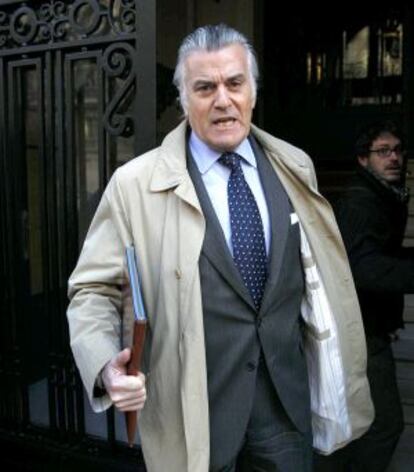Where did former PP treasurer Bárcenas come by 22 million euros?
Associate says investments in art and stock form basis of politician’s Swiss stash

Finance Minister Cristóbal Montoro appeared before a congressional committee on Wednesday to speak on the Luis Bárcenas scandal and the government tax amnesty that the former Popular Party treasurer, according to unconfirmed claims by his lawyer, took advantage of to regularize part of the 22 million euros in undeclared money he had stashed in a Swiss bank.
In the event, Montoro, who has faced calls for his resignation from opposition Socialist leader Alfredo Pérez Rubalcaba, managed to get through the entire grilling without mentioning either Bárcenas or any possible connection with the amnesty. Montoro said it would be worthless if he had done so, as the former treasurer is under judicial investigation.
Neither was there any clarification of whether or not Bárcenas authorized salary top-ups for high-ranking PP officials in the form of stuffed envelopes. Montoro limited himself to saying it would be “despicable and impertinent” to bring the matter up in Congress.
So where exactly did Bárcenas come by 22 million euros? “Luis is clever and has made money,” says Ángel Sanchís, also a former PP treasurer who made his fortune in banking before entering politics in 1978. When Bárcenas opened the account in Switzerland he claimed to be involved in Sanchís’s fruit empire in Argentina, La Moraleja. “It is completely false,” says Sanchís. “He has admitted he did it to make a big noise. All he gave me was authorization to access his account information to assess his stock investments.”
He always thought of himself as a good stock player. And he made money”
However, a transaction for three million euros to Bárcenas’ account from Brixco, a client of Sanchís, raised questions about possible bribes by Gürtel corruption network ringleader Francisco Correa. Sanchís denies this: “I put him in touch with Brixco and it seems it extended a credit line, a commercial credit between two companies. It is a clear and transparent operation.”
The judge investigating Gürtel has asked police analysts to listen to a wire tap in which a man admits to bribing Bárcenas with around six million euros, to determine if the voice belongs to Correa. The recording device was hidden for two years in the pocket of former PP councilor José Luis Peñas, who uncovered the largest corruption network in Spain since the return to democracy. Dozens of high-ranking PP officials feature on the recordings, with the name of Bárcenas being used abundantly.
Does Sanchís fear his name might crop up? “People can suspect anybody. At that time I had no more information than what was in the press. If I knew then what I know now, I wouldn’t have had anything to do with or involved anybody in a commercial operation connected to me. Luis told me that [Gürtel] would not affect him at all. I believed him. He always told me that he had investments in art and stocks in Switzerland. He always thought of himself as a good stock player. And he made money.”







































